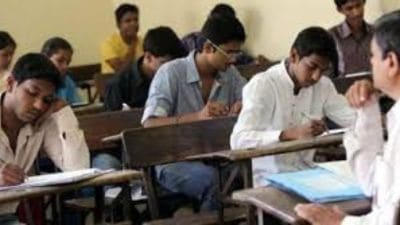- India
- International
Pretty dirty picture: A tale of two Delhi neighbourhoods
When Narendra Modi announced his Swachh Bharat Mission, the brooms came out in strength. But what is the campaign up against?
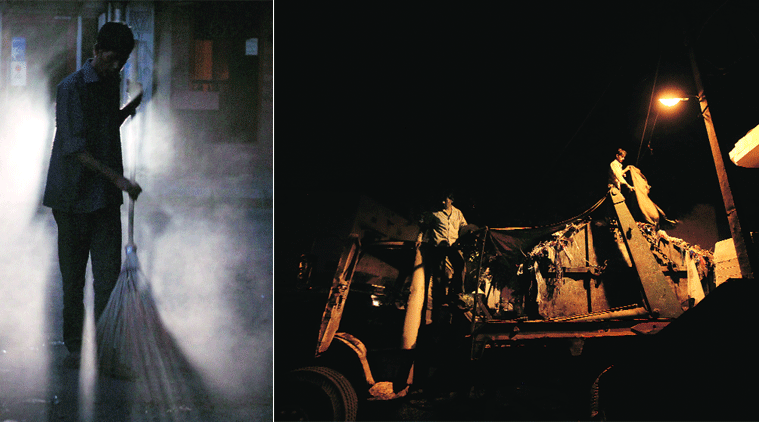 Two colonies in Delhi that are separated by more than the road that divides them.
Two colonies in Delhi that are separated by more than the road that divides them.
Dipankar Ghose and Aniruddha Ghosal spend a night in Defence Colony and Kotla Mubarakpur, two colonies in Delhi that are separated by more than the road that divides them, to watch the daily clean-up operation.
Photographs: Oinam Anand and Ravi Kanojia
(DEFENCE COLONY)
‘Kothiwale ka ek phone, naukri gayi’
He is the infantry. Nameless, faceless, the first line of assault. He arrives when the stench is at its highest. His earnings tomorrow depend on the work he does today. Every day. The influential around him brook no compromise. He is only a ragpicker, and Defence Colony must be clean when its residents awake. Nobody ever asks, but his name is Shah Alam.
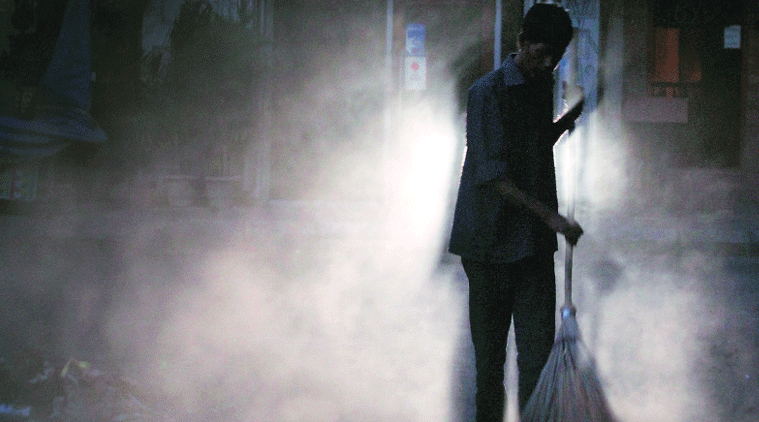 The MCD sweepers begin early, before the walkers are out. “The sahibs scold us if we sweep the dust when they’re out on a walk”.
The MCD sweepers begin early, before the walkers are out. “The sahibs scold us if we sweep the dust when they’re out on a walk”.
As the restaurants and watering holes in the south Delhi market wind down every night, Alam arrives at the alleys at the back by 11:30 pm. He watches as the young men and women emerge from inside places with glittering signboards, merry with drink. And then slowly, as the clock strikes twelve, the doors at the rear begin to open, and the waste comes out.
His fingers are quick, practised. His hands go through everything. Cardboard, plastic, glass and thermocol can all be sold again at the junkyard, and find their way into his rickshaw. Rotten food, peeled vegetables, broken eggs are piled together at one spot, to be taken to the MCD garbage station or dhalaon in one corner of the market early in the morning. His work is long and arduous, with only combative dogs for company. Alam has long given up hope that he will get a “sarkari naukri”.
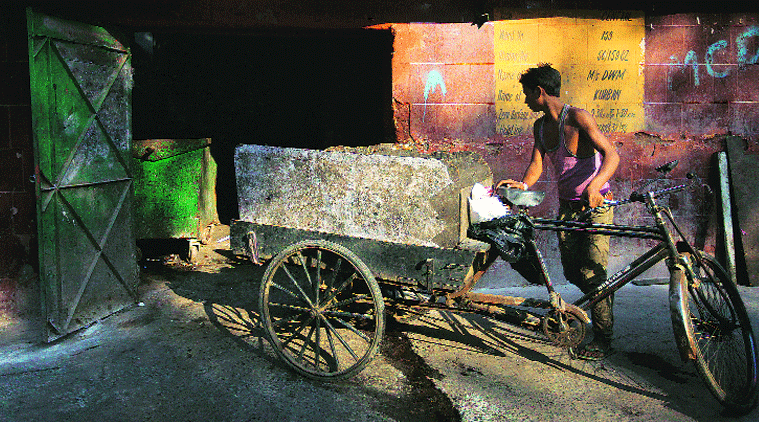 Shah Alam, a ragpicker, has long given up hope that he will get a job with the MCD.
Shah Alam, a ragpicker, has long given up hope that he will get a job with the MCD.
“When my uncle brought me from Assam five years ago, he told me that I would get a government job. But that never happened, and I moved out on my own to Madanpur Khadar (an urban village in south Delhi) and started picking rags. The owner of the restaurants tell me sometimes that they will speak for me with the MCD. But I’m poor, not stupid. They don’t even know my name. They call me Kalu, or just whistle for my attention. They will do nothing,” says Alam.

The five restaurants he collects garbage from pay him Rs 700 a month. Another Rs 250 a day comes from the scrap he sells at the junkyard near Madanpur Khadar. Alam has also wrangled a deal from the kitchen of a top restaurant. They pay him the usual money, but also give him food left over by customers. Every night, he spreads out a plastic sheet in the middle of the road, next to a pile of rubbish and an abandoned car, and sits down to eat. Some days, it’s only salad. Today, it’s roti and chicken. “It tastes good,” he says, smiling broadly for the first time. Two dogs come sniffing. The bones go to them and they eat together. It’s the best part of their day.
At 3 am, 50-year-old Ali, also from Assam, makes his way from one garbage station to the other in C-Block — there are about 30 dhalaons in the colony.
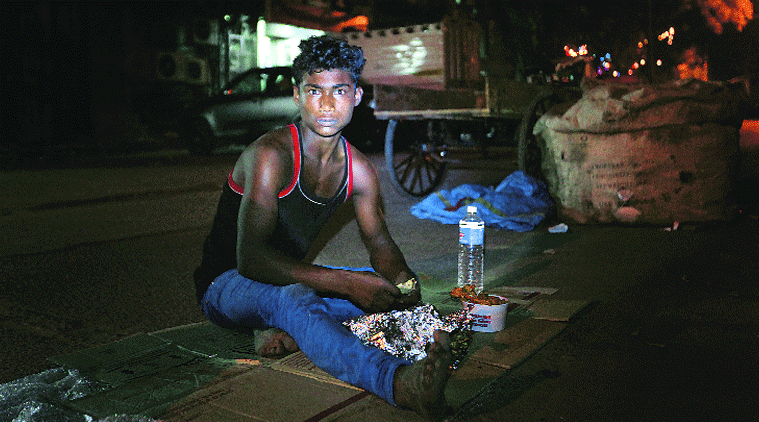 There are about 30 dhalaons or garbage stations in the colony.
There are about 30 dhalaons or garbage stations in the colony.
There are advantages to being a ragpicker in Defence Colony. Even the rubbish speaks of the affluence of the homes around. It is all in neat, black plastic bags. Sometimes the food and the plastic is already segregated. As Ali rummages through the waste at the dhalaon, he finds 16 cardboard and plastic boxes, each from food that was taken away from restaurants. “Sometimes I get four glass bottles in a day. Each of them can be sold for Rs 40,” he says, holding up an empty bottle of champagne. A beer can fetches Rs 1.50, a crushed beer can earns him a rupee.
By the time the first rays of morning sneak up on Defence Colony, Ali and Alam recede into the shadows. And the cavalry arrives.
Armed with green MCD wheelbarrows and brooms taller than themselves, the government sweepers and cleaners begin to appear, their work made easier by those who came before them but difficult nonetheless. The streets, littered with leaves and paper through the day, will need to be cleaned and the rubbish piled up on the streets by ragpickers will have to be transported to the dhalaons.
Jagdish Singh, 45, first came to Delhi as an 18-year-old from Churu in Rajasthan. For 26 years, he has cleaned the market and A-Block in Defence Colony. “The duty time for us MCD sweepers is from 7 in the morning. But like many others, I reach at 5.30. Once people begin to bring out their cars and park them either in the market or outside the park, it gets very difficult. The sahibs scold us if we sweep the dust when they’re out on a walk. So it is best to finish most of the work before anyone is awake,” says Singh, sweeping the market in a vest and trousers.
He may be a regular MCD employee, but Singh’s job depends on the influence residents yield. “Yesterday was Valmiki Jayanti and none of us worked. I knew there would be more work today, so I brought Ganga Prasad with me,” he says, pointing to another sweeper. “He is not an MCD worker, but I will pay him out of my own salary of Rs 20,000. If I leave behind even one pile of garbage or not sweep a street, there will be trouble. Kothiwale ek phone kar denge, aur naukri gayi (All these people in bungalows have to do is make one phone call and we lose our jobs). This place doesn’t need the Swachh Bharat campaign. It has always been this way,” he says.
Soon, it is time for the heavy artillery. At dot 9 am, a green MCD truck arrives at Garbage Station No 16. On the wall outside are instructions. Only “dry waste” is meant to be thrown in: “haddiyan, panni, paper (bones, plastic, paper),” the wall says. “No urinating” says another message that’s plastered in large font. All the rules are followed.
Inside the dhalaon is a large, green, wheeled container. Two men in green uniforms alight from the MCD truck. They refuse to speak at length. “You can watch what we do. There is no time to stop and talk,” says one of them. The truck backs into the dhalaon and the container is emptied into the truck. They move on to the next. When they leave, there is nothing left. The tiles glisten white. The streets are swept, the market clean. When night falls, the operation will begin again. Shah Alam will return.
(KOTLA MUBARAKPUR)
The bins never stop flowing
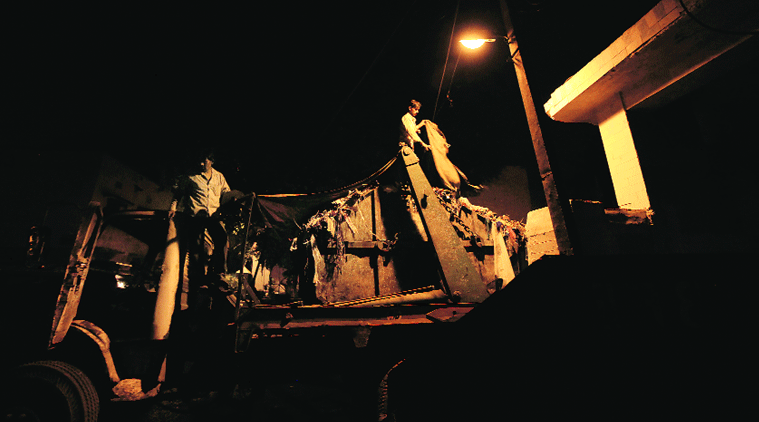 A little after midnight, a truck backs into one of the three dhalaons in Kotla Mubarakpur and takes away the trash.
A little after midnight, a truck backs into one of the three dhalaons in Kotla Mubarakpur and takes away the trash.
The cows saunter in at 3 am. The night’s usually kinder — no blaring horns and no one pushing them away every time they try to eat off vegetable carts. So they simply put their heads down and eat. Anything. Vegetable waste, rotting food, even the occasional plastic that comes with the food.
Here in Kotla Mubarakpur, a locality in south Delhi sandwiched between the posh neighbourhoods of Defence Colony and South Extension, the cows are at the frontline of a giant clean-up machinery that rouses itself soon after the city sleeps. Like Ravi Das, a safai karamchari for the Municipal Corporation of Delhi, says, “Aadha hum saaf kar lenge, aadhi gai kha legi (Half we’ll clean, the rest the cows will eat).”
Despite the many medieval tombs tucked away in the village, the pressures of modernity are everywhere — garbage stations or dhalaons overflowing with garbage and the mandi lanes thick with rotting vegetable waste.
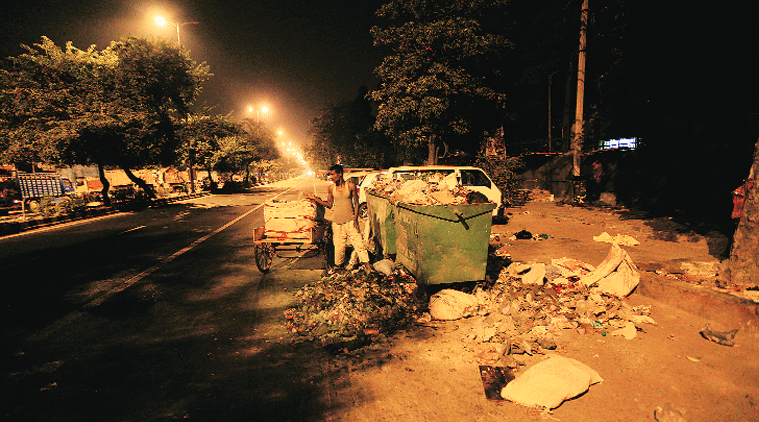 While the MCD claims it has enough resources, the streets tell another story
While the MCD claims it has enough resources, the streets tell another story
While the MCD claims it has almost 200 safai karamcharis in the village, three garbage stations, enough dustbins, two garbage trucks that come to clean the village at night and sweepers who tip the garbage into the dumps in the morning, Kotla Mubarakpur’s streets tell a different story.
So do the residents. “The garbage truck comes once every two days. Sometimes, not even that. All the garbage from the main market collects here and spills on to the roads,” says Ravikant Mishra, the priest at a temple on the main road that leads from Defence Colony into Kotla Mubarakpur. Next to the temple is a dhalaon which, he says, is rarely cleared.
This is the first of the three garbage stations in Kotla Mubarakpur. The second is near the village’s only green space, Bapu Park. A little after midnight on Tuesday, a truck rattles down the colony and parks itself near the third dhalaon — north of the village, adjacent to the colony of Sewa Nagar. Driver Afresh Kumar, 38, and his “helper” Anil, 26, work as contractual employees for the waste-to-energy plant at the Okhla landfill site in southeast Delhi. They say they are at this dhalaon every second night; tomorrow, for instance, they will be at the dhalaon on the main road. Their truck is too big to get into the smaller lanes, so the MCD truck goes to the garbage station near Bapu Park.
With practiced ease, Afresh backs the clunky truck into the dhalaon. Anil scampers down and chains a plastic cart full of garbage to the rear of the truck. The vehicle creaks from the effort, dangerously tipping to one side as it hauls the green cart. “Now we’ll go straight back to the Okhla landfill and unload this cart,” says Afresh, who earns Rs 11,000 a month.
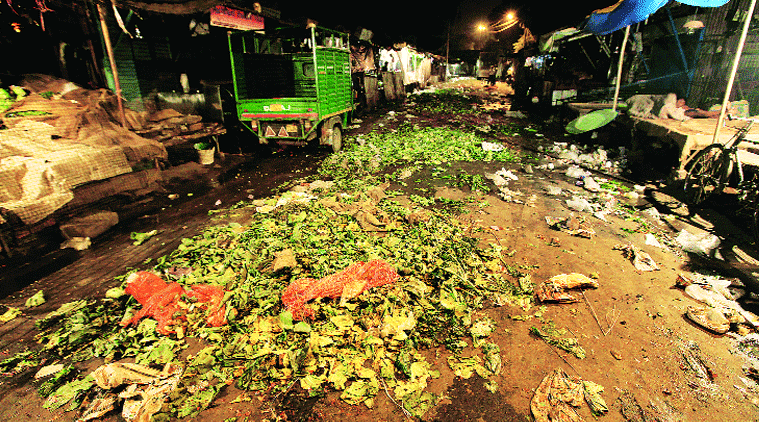 The mandi is thick with trash
The mandi is thick with trash
They hop back into the truck and the hulk rattles its way out. Kotla Mubarakpur is all quiet. It’s 1.30 am and the vegetable mandi in the heart of the village has wound up, if only for a few hours. The street is littered with trampled greens, crushed tomatoes and rotting fruits. Here, too, the cows are at work, dutifully.
By 3 am, the market stirs to life. The cows have feasted enough and now sit ruminating. The shopkeepers start cleaning up. Some have hired workers to cart the trash outside their shops to the nearest dhalaon, others simply pile it up, hoping the MCD workers will clear it — “when they arrive”. The trash will eventually make its way to the garbage station that Afresh and Anil have just cleared. In a few hours, the green bin at the dump will overflow, like it had never been cleared.
Opposite the mandi, Kunwer and his wife sit on separate cots, guarding a room marked ‘MCD store’. The stench from the public urinal is unbearable but it has long stopped bothering him. Soon, the sweepers will turn up here and Kunwer will hand them over their brooms. “There are about 30 safai karamcharis who work here. That includes the sweepers and the garbage truck drivers. There are two garbage trucks that take turns to come here. But it’s not enough. Not even close,” he says.
A few metres away, at a bin on the road that divides Kotla Mubarakpur and Defence Colony, Ansari Sheikh is busy at work. It’s 4 am and Sheikh has only a couple of hours left to rummage through the bin for plastic bottles and cardboard. The MCD sweepers will be here by 6 am and they don’t always take kindly to ragpickers. Besides, ragpickers can get into nasty fights with each other over the “best bin”. The 24-year-old from Assam came to Delhi five years ago; now his family makes a living off the city’s waste.
It’s dawn and Sheikh has cleared out with his loot of crushed plastic bottles and torn cardboard. The safai karamcharis, around 10 of them, arrive, armed with the brooms that Kunwer has been guarding all night. They fan out into the village and sweep the streets before the village wakes up and more garbage gets flung in the direction of the nearest dump. “Once everyone is awake and the vehicles start moving, it’s harder to sweep. We must clean the roads as much as we can early in the morning,” says Suresh Kumar, an MCD safai karamchari.
The garbage is swept off the roads and collected in piles in street corners, from where it will be taken to the three dumps. At least three cleaners on cycle-carts move through the village, going door to door, collecting packets of garbage from households. This too will end up in the garbage dumps.
By 8 am, the village is up. Scooters whiz past the workers as they continue cleaning, their brooms swinging rhythmically. But only a couple of hours later, Kotla Mubarakpur looks like it has never been cleaned — the dhalaons are full and the streets lined with plastic.
Kusum Lata, the MCD councillor for Kotla Mubarakpur who is from the Congress, says, “Earlier there were almost 200 MCD workers here. Now a number of those workers have been reallocated to other wards. I have asked for a report from the MCD on how many workers are still left here. I am yet to get any response.”
The MCD truck hasn’t arrived yet at the dump on the main road. It should have by now, says a resident. At least it does come on most days, says another. No one seems unduly worried about the delay. Least of all the cows, contently ruminating over a night well spent.
Apr 24: Latest News
- 01
- 02
- 03
- 04
- 05











